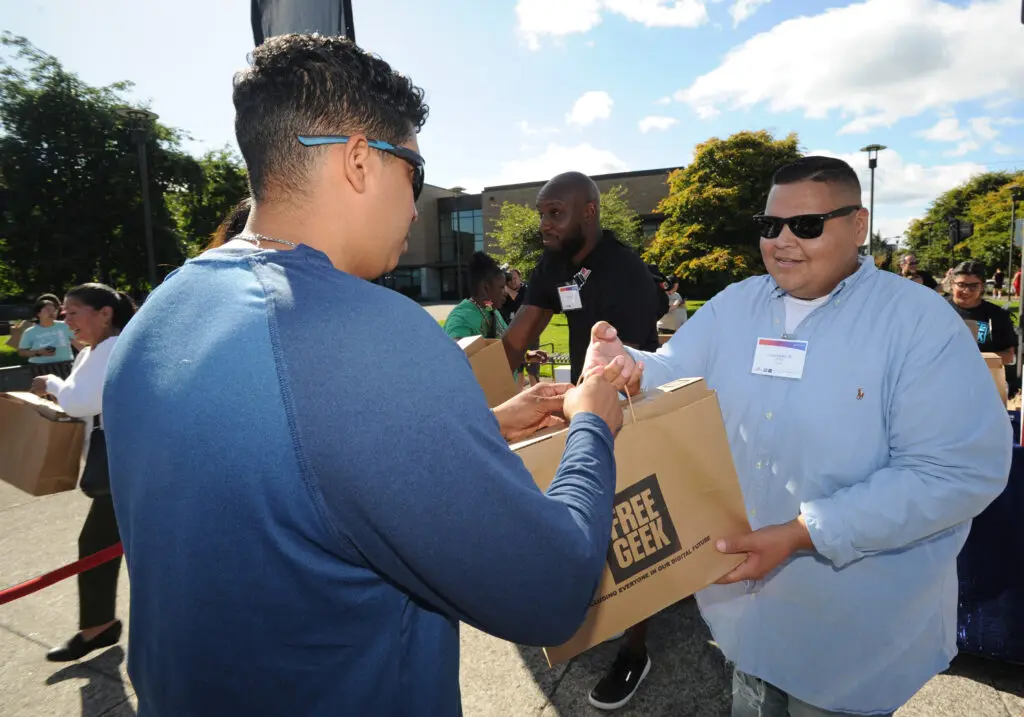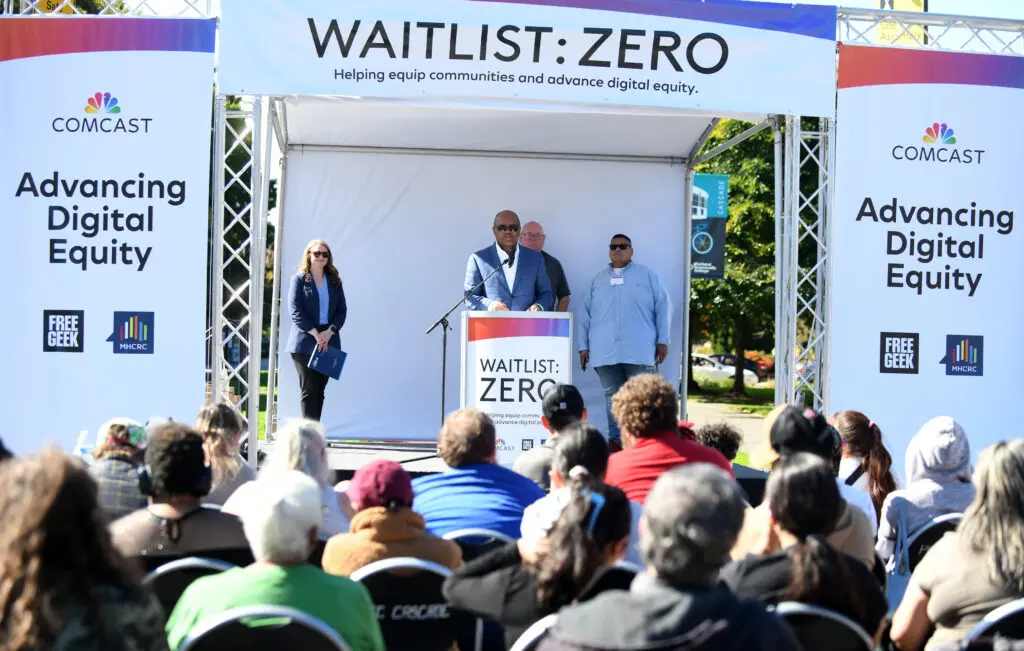Mt. Hood Regulatory Commission and Comcast Commit Additional $2 Million to Shrink Digital Divide in Multnomah County
Comcast Will Also Open Lift Zones to Offer Free Wi-Fi in Community Facilities
Mt. Hood Cable Regulatory Commission (MHCRC) and Comcast held an event on Sunday to announce a $2 million investment to help bridge the digital divide in Multnomah County. According to a recent report, the critical need to be online is well established — using the internet is no longer optional to fully participate in education, the economy, healthcare, and civic and cultural life. Yet many Multnomah County residents — 18% of households with income under $30,000, 28% for those 65 years or older, and 30% for Hispanic households — do not subscribe to broadband internet service at home.
Free Geek, a leading local non-profit advancing economic equity through tech training and career building, will receive the $1 million to purchase over 3,700 discounted laptops from Dell for distribution to community members who need them most. In addition, Comcast will invest to install Lift Zones that provide free Wi-Fi in community facilities to support students, families, adults, and veterans. Comcast currently has 23 Lift Zones located in neighborhood community centers and non-profit organizations in Oregon.

“The digital divide continues to be a persistent challenge for communities in Multnomah County with more than 3,000 residents who do not own a computer and many others who don’t know how to use it effectively,” said Juan Muro Executive Director for Free Geek. “This investment will help ensure that these families have the same benefits as others and their children have the devices and digital skills training they need to access online resources to be successful in school.”
Free Geek’s mission is to help the most disconnected communities in Multnomah County get online and receive the resources, devices, and technology education needed to help close the homework gap, increase economic mobility, and advance digital equity. After making the announcement on Sunday, Free Geek distributed an initial 500 brand new Dell laptops to families who had been waiting for new devices.
“The unfortunate reality is that not everyone has the resources and digital skills they need to benefit from online resources,” said Broderick Johnson, Executive Vice President, Public Policy & Executive Vice President, Digital Equity for Comcast. “By building more Lift Zones and continuing our partnership with Free Geek, we are helping to produce measurable outcomes that will create a more prepared and inclusive workforce and help ensure that under-resourced communities are not left behind.”

The contribution to Free Geek and additional Lift Zones are the latest example of Comcast and MHCRS’s investment to advance digital equity in Multnomah County. Last year, Comcast and MHCRC invested $2 million in Free Geek and their digital equity goals. Since that initial investment, Free Geek has:
- Expanded their training capacity by hiring three new digital navigators and a volunteer coordinator who help families with tech support and advice.
- Provided internet services to 3,200 community members.
- Distributed 662 new or refurbished laptops for free.
- Conducted 41 digital skills training classes and expanded their training curriculum.
- Expanded their partnerships to other nonprofits, including Hacienda CDC, IRCO, Latino Network, Guerras Latinas, PCC, Naya, AfroVillage PDX and more.
“MHCRC is proud of the role we get to play in ongoing public and private partnerships in our city and county. Without the cable franchise agreements with Comcast, none of this would be possible,” said Julia DeGraw, MHCRC Chair – Portland Representative. “These opportunities provide substantive digital access, and we are confident that Free Geek is a dedicated partner with a community centric approach to bridging the digital divide.”
Over the last three years, Comcast has made more than $5 million in cash and in-kind contributions to Oregon nonprofit organizations. These contributions support local community programs that help establish and promote the company’s Digital Equity Network in Oregon. Comcast’s network of digital equity partners acquire technology equipment, provide digital skills trainings, and offer opportunities for community members to explore and train for careers in tech-related fields, or develop the kinds of digital skills that can help them launch and grow their own business.
For more information about Free Geek please visit: www.freegeek.org/digitalequity

DIGITAL EQUITY NETWORK
As the world becomes more digital, it’s Comcast’s goal to ensure that everyone can participate and excel in today’s society. We have been committed to creating and supporting digital equity within the communities we serve for more than a decade. Over the past three years, Comcast has invested more than $5 million in cash and in-kind services to more than 80 non-profit organizations in Oregon. This investment is supporting digital skills training programs, building more Wi-Fi-connected Lift Zones, and providing grants to organizations that help bridge the digital skills divide for thousands of people.
The investment also is part of Comcast’s Digital Equity Network – an interconnected group of organizations in the Pacific Northwest that work collectively to increase access and adoption of the internet, help people get online, build digital skills, and open doors to economic mobility.

Comcast’s network of digital equity partners distributes technology equipment, provide digital skills trainings, and offer opportunities for community members to explore and train for careers in tech-related fields, or develop the kinds of digital skills that can help them launch and grow their own business. They also help income-constrained individuals and households sign up for low-cost, high-speed broadband through Internet Essentials.
These trusted community organizations in Oregon include Boys & Girls Clubs, Free Geek, Hacienda CDC, Asian Pacific American Network of Oregon, Native American Youth & Family Center, The Arc of Lane County, Self Enhancement Inc., Girls Inc., and many more.


INTERNET ESSENTIALS
Connecting people to the internet and the online resources it provides are critical priorities for Comcast. The gap between people who benefit from using online resources and those who are not is called the digital divide, and it exists in underserved communities throughout Washington state. For over a decade, we’ve worked hard to address this challenge and have connected more than 118,000 households in Oregon to high-speed Internet at home, many for the first time, through our Internet Essentials program.
Internet Essentials addresses the barriers to internet adoption through free digital literacy training resources, the option to purchase a discounted computer, and low-cost, high-speed Internet for under ten dollars a month, plus tax. Through this program, we’ve been able to connect students, families, and communities needing affordable internet resources. But more needs to be done.


LIFT ZONES
We know that thousands of Oregonians also depend on community centers and non-profits for access to the Internet, and our Lift Zone initiative aims to address that need. Through our Lift Zone initiative, we have equipped more than 20 Lift Zones with free internet service throughout the state.
Lift Zones provide Oregon residents with locations to access online education, healthcare, and employment resources. Some of Lift Zones also receive state-of-the-art technology makeovers from Comcast, including new laptops and technology that will help our community partners offer job skills training, education, computer classes, internships, and more. Lift Zones in Oregon may be found at: https://www.internetessentials.com/learningSearchPage.
Oregon Lift Zone Locations


THE COMMUNITIES WE SERVE
Comcast seeks to develop deep community partnerships that help promote goodwill and create a lasting impact on our state. We serve and partner with groups including, but limited to, Women, LGBTQ, Hispanic/Latinx, Indigenous/Urban India, Black Americans, Asian Pacific Americans, Veterans and Military Families, Individuals with Intellectual and Developmental Disabilities (I/DD) and low-income/vulnerable families.
